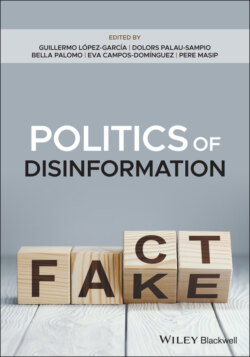Читать книгу Politics of Disinformation - Группа авторов - Страница 28
References
Оглавление1 Allcott, H.and Gentzkow, M.(2017). Social media and fake news in the 2016 election. Journal of Economic Perspectives 31 (2): 211–236.
2 Bakir, V.and McStay, A.(2017). Fake news and the economy of emotions: problems, causes, solutions. Digital Journalism. doi: 10.1080/21670811.2017.1345645.
3 Barrera, O., Guriev, S., Henry, E., and Zhuravskaya, E.(2020). Facts, alternative facts, and fact checking in times of post-truth politics. Journal of Public Economics 182: 1–19.
4 Bell, E.and Owen, T.(2017). The platform press: how Silicon Valley reengineered journalism. Columbia University. https://academiccommons.columbia.edu/doi/10.7916/D8R216ZZ (accessed 6 October 2020).
5 Bennett, W.and Livingston, S.(2018). The disinformation order: disruptive communication and the decline of democratic institutions. European Journal of Communication 33 (2): 122–139.
6 Braun, J.and Eklund, J.(2019). Fake news, real money: ad tech platforms, profit-driven hoaxes, and the business of journalism. Digital Journalism 7 (1): 1–21.
7 Coady, D.(2019). The trouble with ‘fake news’. Social Epistemology Review and Reply Collective 8 (10): 40–52.
8 Dentith, M.(2017). The problem of fake news. Public Reason 8 (1–2): 65–79.
9 Egelhofer, J.and Lecheler, S.(2019). Fake news as a two-dimensional phenomenon: a framework and research agenda. Annals of the International Communication Association: 1–20. doi: 10.1080/23808985.2019.1602782.
10 Fallis, D.and Mathiesen, K.(2019). Fake news is counterfeit news. Inquiry: 1–20. doi: 10.1080/0020174X.2019.1688179.
11 Farkas, J.and Schou, J.(2018). Fake news as a floating signifier: hegemony, antagonism and the politics of falsehood. Javnost – The Public 25 (3): 298–314.
12 Faulkner, P.(2018). Fake barns, fake news. Social Epistemology Review and Reply Collective 7 (6): 16–21.
13 Figaro, R., Nonato, C., and Grohmann, R.(2015). Los ambios en el mundo del trabajo del periodista. Barcelona: Atlántica.
14 Friedman, T.(2006). The Word Is Flat. The New Globalization World in the Twenty-first Century. London: Penguin Books.
15 Gelfert, A.(2018). Fake news: a definition. Informal Logic 38 (1): 84–117.
16 Graham, R.(2017). Google and advertising: digital capitalism in the context of Post-Fordism, the reification of language, and the rise of fake news. Palgrave Communication 3 (45): 1–19.
17 Graves, L.and Anderson, C.(2020). Discipline and promote: building infrastructure and managing algorithms in a “structured journalism” project by professional fact-checking groups. New Media & Society 22 (2): 342–360.
18 Habgood-Coote, J.(2018). Stop talking about fake news! Inquiry 62 (9–10): 1–33.
19 Humprecht, E.(2018). Where fake news flourishes: a comparison across four Western democracies. Information, Communication & Society: 1–16. doi: 10.1080/1369118X.2018.1474241.
20 Jang, S.and Kim, J.(2018). Third person effects on fake news: fake news regulation and media literacy interventions. Computers in Human Behavior 80: 295–302.
21 Jaster, R.and Lanius, D.(2018). What is fake news? Versus 2 (127): 207–227.
22 Kshetri, N.and Voas, J.(2017). The economics of “fake news”. IEEE IT Professional 19 (6): 8–12.
23 Levy, N.(2017). The bad news about fake news. Social Epistemology Review and Reply Collective 6 (8): 20–36.
24 Marx, K.(1990). Capital, Volume 1 (trans. B. Fowkes). London: Penguin Classics. Original work published 1867.
25 Marx, K.(2015). Grundrisse (trans. M. Nicolaus). Marxists Internet Archive. Original work published 1939–1941. https://www.marxists.org/archive/marx/works/1857/grundrisse/index.htm (accessed 6 October 2020).
26 Mejias, U.and Couldry, N.(2019). Datafication. Internet Policy Review 8 (4): 1–10.
27 Mukerji, N.(2018). What is fake news? Ergo 5 (35): 923–946.
28 Nelson, J.and Taneja, H.(2018). The small, disloyal fake news audience: the role of audience availability in fake news consumption. New Media & Society 20 (10): 3720–3737.
29 Nicey, J.and Bigot, L.(2020). Le soutien de Google et de Facebook au fact-checking français: entre transparence et dependence. Sur le Journalism 9 (1): 58–73.
30 Nieborg, D.and Poell, T.(2018). The platformization of cultural production: theorizing the contingent cultural commodity. New Media & Society: 1–18. doi: 10.1177/1461444818769694.
31 Nielsen, R.and Ganter, S.(2017). Dealing with digital intermediaries: a case study of the relations between publishers and platforms. New Media & Society: 1–18. doi: 10.1177/1461444817701318.
32 Pepp, J., Michaelson, E., and Sterken, R.(2019). What’s new about fake news? Journal of Ethics and Social Philosophy 16 (2): 67–94.
33 Rahman, K.and Thelen, K.(2019). The rise of the platform business model and the transformation of twenty-first-century capitalism. Politics & Society: 1–28. doi: 10.1177/0032329219838932.
34 Rini, R.(2017). Fake news and partisan epistemology. Kennedy Institute of Ethics Journal 27 (2): 43–64.
35 Sadowski, J.(2019). When data is capital: datafication, accumulation, and extraction. Big Data & Society: 1–12. doi: 10.1177/2053951718820549.
36 Sadowski, J.(2020). The Internet of landlords: digital platforms and new mechanisms of rentier capitalism. Antipode 52 (2): 562–580.
37 Schwarz, J.(2017). Platform logic: an interdisciplinary approach to the platform-based economy. Policy and Internet: 1–21. doi: 10.1002/poi3.159.
38 Srnicek, N.(2018). Capitalismo de Plataformas. Buenos Aires: Caja Negra.
39 Tandoc Jr., E., Lim, Z., and Ling, R.(2018). Defining “fake news”. Digital Journalism 6 (2): 137–153.
40 Tenove, C.(2020). Protecting democracy from disinformation: normative threats and policy responses. The International Journal of Press/Politics: 1–21. doi: 10.1177/1940161220918740.
41 Van Duyn, E.and Collier, J.(2018). Priming and fake news: the effects of elite discourse on evaluations of news media. Mass Communication and Society: 1–31. doi: 10.1080/15205436.2018.1511807.
42 Vargo, C., Guo, L., and Amazeen, M.(2018). The agenda-setting power of fake news: a big data analysis of the online media landscape from 2014 to 2016. New Media & Society 20 (5): 2028–2049.
